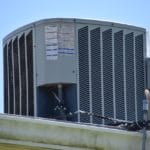Different types of HVAC filters
HVAC filters play a crucial role in maintaining indoor air quality, protecting HVAC equipment, and ensuring optimal system performance. However, many homeowners overlook the importance of filters or may not fully understand their function and significance. In this article, we will delve into the world of HVAC filters, exploring their importance, the different types available from HVAC contractors, and guidelines for proper replacement.
Importance of HVAC Filters
HVAC filters serve several important functions within a heating, ventilation, and air conditioning (HVAC) system. Firstly, they trap airborne particles such as dust, pollen, pet dander, and mold spores, preventing them from circulating throughout the home and improving indoor air quality. This is particularly beneficial for individuals with allergies, asthma, or other respiratory conditions.
Secondly, filters protect HVAC equipment by preventing debris from accumulating on components such as coils, motors, and fans, which can reduce efficiency and lead to costly repairs. Finally, clean filters promote efficient airflow, ensuring that the HVAC system operates at peak performance while minimizing energy consumption and utility costs.
Types of HVAC Filters
There are several types of HVAC filters available on the market, each with its own characteristics, filtration efficiency, and suitability for different applications. The most common types of HVAC filters include:
Fiberglass Filters
Fiberglass filters are the most basic and inexpensive option available. They consist of a thin layer of fiberglass mesh that traps larger particles but may allow smaller particles to pass through. While fiberglass filters are affordable, they offer minimal filtration efficiency and need to be replaced frequently.
Pleated Filters
Pleated filters feature a folded or pleated design that increases the surface area available for trapping airborne particles. They are made from polyester or cotton paper and offer higher filtration efficiency than fiberglass filters. Pleated filters are available in various sizes and MERV (Minimum Efficiency Reporting Value) ratings, indicating their effectiveness at capturing particles of different sizes.
Electrostatic Filters
Electrostatic filters use an electrostatic charge to attract and trap particles as air passes through the filter. They are available in both disposable and washable varieties and offer superior filtration efficiency compared to fiberglass and pleated filters. However, washable electrostatic filters require regular cleaning to maintain effectiveness.
High-Efficiency Particulate Air (HEPA) Filters
HEPA filters are the gold standard in air filtration, capable of capturing 99.97% of particles as small as 0.3 microns in size. They are highly effective at removing allergens, bacteria, and viruses from the air but may require modifications to the HVAC system to accommodate their size and airflow requirements.
Guidelines for Replacement
Regular filter replacement is essential for maintaining optimal HVAC performance and indoor air quality. The frequency of filter replacement depends on several factors, including the type of filter, household size, presence of pets, and indoor air quality concerns. As a general rule of thumb:
- Fiberglass filters should be replaced every 30 days.
- Pleated filters should be replaced every 60 to 90 days.
- Washable electrostatic filters should be cleaned every 30 to 60 days.
- HEPA filters should be replaced according to the manufacturer’s guidelines, typically every 6 to 12 months.
It’s also essential to inspect filters regularly for signs of dirt, debris, or damage and replace them sooner if they appear dirty or clogged. Additionally, consider upgrading to a higher MERV-rated filter if indoor air quality is a priority or if household members have allergies or respiratory conditions.
Factors to Consider When Choosing HVAC Filters
Discuss important factors to consider when selecting HVAC filters for your home, including filtration efficiency, airflow resistance, and compatibility with your HVAC system. Explain the significance of the Minimum Efficiency Reporting Value (MERV) rating, which indicates a filter’s effectiveness at capturing particles of varying sizes.
Consider other factors such as filter size, material, and cost, as well as any specific indoor air quality concerns or HVAC system requirements that may influence your filter selection. Provide guidance on choosing the right filter for your needs, whether it’s maximizing filtration efficiency, improving airflow, or addressing specific allergens or contaminants in your home environment.
DIY HVAC Filter Maintenance Tips
Offer practical tips and techniques for DIY HVAC filter maintenance to help homeowners keep their filters clean and functioning optimally between replacements. Provide step-by-step instructions for safely removing and inspecting filters, as well as methods for cleaning washable filters using water and mild detergent.
Offer guidance on proper handling and disposal of disposable filters, including how to safely remove and discard them without releasing captured particles back into the air. Encourage homeowners to incorporate filter maintenance into their regular home maintenance routine to ensure consistent performance and longevity of their HVAC system.
Benefits of Professional HVAC Maintenance
Highlight the advantages of professional HVAC maintenance services, which often include filter inspection, cleaning, and replacement as part of a comprehensive maintenance plan. Discuss how professional technicians can identify and address potential issues with filters, such as improper installation, airflow restrictions, or equipment compatibility issues.
Emphasize the importance of scheduling regular HVAC maintenance appointments to ensure that filters are properly maintained and replaced on schedule, reducing the risk of equipment malfunctions, breakdowns, and costly repairs. Provide information on reputable AC repair services Vienna in your area and encourage homeowners to invest in professional maintenance for optimal HVAC performance and longevity.
Environmental Considerations
Address environmental considerations related to HVAC filters, including their impact on indoor air quality, energy consumption, and sustainability. Discuss the environmental benefits of using high-efficiency filters, which can help reduce indoor air pollution and minimize the need for energy-intensive air purification methods.
Consider the environmental implications of disposable versus washable filters, including waste generation, resource consumption, and lifecycle analysis. Provide tips for environmentally responsible filter disposal or recycling, as well as options for eco-friendly filter materials or sustainable filtration solutions that minimize environmental impact while maximizing indoor air quality and HVAC efficiency.
Advanced Filtration Technologies
Explore emerging trends and innovations in HVAC filtration technology, such as ultraviolet (UV) germicidal irradiation, photocatalytic oxidation, and activated carbon filtration. Discuss how these advanced filtration technologies can enhance indoor air quality by targeting specific contaminants such as airborne pathogens, volatile organic compounds (VOCs), and odors. Explain the potential benefits and considerations of incorporating advanced filtration technologies into your HVAC system, including installation requirements, maintenance needs, and cost considerations. Provide guidance on evaluating the suitability of advanced filtration solutions for your home based on your indoor air quality concerns, budget, and desired level of filtration performance.
Conclusion
HVAC filters play a critical role in maintaining indoor air quality, protecting HVAC equipment, and ensuring optimal system performance. By understanding the importance of filters, knowing the different types available, and following guidelines for proper replacement, homeowners can effectively maintain a healthy and comfortable indoor environment. Remember to prioritize regular filter maintenance from HVAC repair services Chantilly as part of your overall HVAC care routine to enjoy cleaner air, lower energy costs, and extended equipment lifespan.

What Are The Problems With Hard Water?

How To Repair Chimney Mortar

